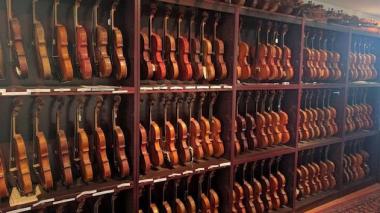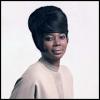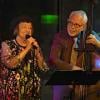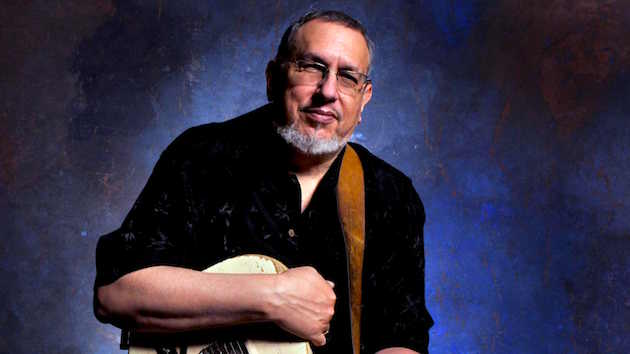
David Bromberg has an intriguing relationship with numbers. During more than five decades as a singer-songwriter, guitarist, and session musician, he collected more than 263 historic American violins valued at approximately $1.7 million. Establishing himself as a major figure in the emerging progressive-bluegrass (“newgrass”) movement in the 1970s and burning out from the hectic pace of tours that left little time to actually practice or compose music, he took a 22-year, self-imposed exile from performing to be cultural ambassador for Wilmington, Delaware. After having recorded a half-dozen albums and working as a producer or sideman with Phoebe Snow, Bob Dylan, Eagles, Ringo Starr, and many other musicians — while mastering styles including jazz, blues, bluegrass, newgrass, country, folk, Irish fiddle music, roots, Americana, rock, and such — it seemed unlikely Bromberg could top expectations.
But Bromberg, singing and performing on a number of stringed instruments — fingerpicked and slide guitar, fiddle, dobro, mandolin — returned to the stage in 2002 and resumed raising his tally of accomplishments. While continuing to own and operate David Bromberg Fine Violins in Wilmington, Bromberg again performed, recorded, and toured, primarily in collaboration with other artists and with his quintet.
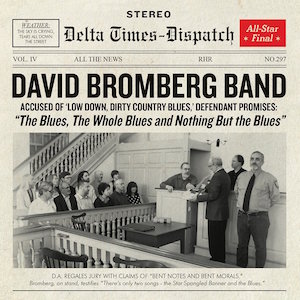
Recent albums include Use Me (2011), for which Bromberg invited musicians including Levon Helm, Dr. John, Los Lobos, Linda Ronstadt, John Hiatt, Keb’ Mo’, and others to produce and/or perform with him doing versions of their songs; Only Slightly Mad, an album showcasing Bromberg’s versatility as he moves from blues to gospel, Irish jigs, bluegrass, and English drinking songs — accompanied by stringed instruments, horns, keyboards, or even a cappella; and a blues tribute that swings from jazz to gospel to country in The Blues, the Whole Blues and Nothing But the Blues.
Sensations seems to follow Bromberg, most recently when an agreement made in 2016 with the Library of Congress to purchase his violin collection and keep it intact fell through. Now, because of a lack of funds to support the library’s complete acquisition, the 263 violins made between 1848 and 1950, are at risk of being divided and sold piecemeal. With the news of historic instruments in peril and two upcoming shows Sept. 17 and 18 at the Freight & Salvage in Berkeley, it seemed a good time to catch up with Bromberg.
Can we start with an update about the violin collection? What is the latest news on the breakup?
The whole story is that I signed a contract after a few years of negotiation with the Library of Congress where they were going to raise enough money to purchase between one-third and one-half of my collection and I would donate the rest. We lost two years of raising funds when a new staff came in. They had different priorities than the prior administration and didn’t want us to assist in raising money for them — I don’t know why not. The bottom line is the Library of Congress is really the right place for us. If someone is still interested in participating, we can hook it up and make it happen. It’s coming down to the point where I’ll have to break up the collection. This is my life savings, so without selling at least a portion of it in bulk, it would be only a dribble. I can’t do that.
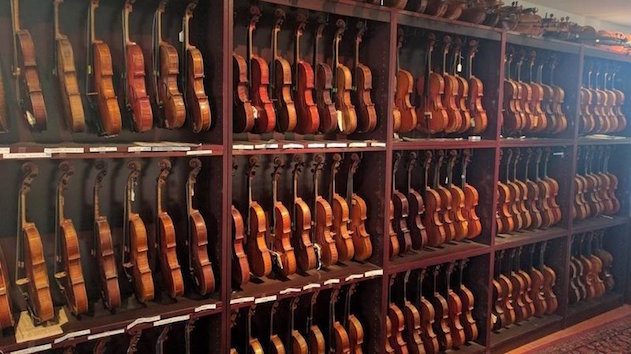
Your prolific collecting of violins might mean that you also have the collecting bug in other areas. Is that true? What else do you collect?
For a while I collected wristwatches. I let that go. I’ve collected guitars and that’s about it. I collect stories about the town of Mirecourt, France — it’s the violin-building capital of France — and stories about the violin makers from that area. It’s where every French violin maker began their studies. If there are 20 French violin makers of note that didn’t study in Mirecourt, I’ve never heard of any of them.
You said in an interview you think the years during which you were living in Marin County in California — because of the difficulty of getting together with other musicians to jam compared to when you lived in the Village in New York — was a big reason you burned out and stepped away from music. Do you still think that, and do you continue to believe New York, Los Angeles, and Nashville are the centers for gaining recognition in the field?
Living in Marin may have had something to do with it. In New York, you take a subway or cab and you’re there. In Marin you drive for two hours just to meet up with one other person. I think Marin is where musicians go to retire, mostly. I don’t think the centers for music have moved at all. It’s because of the press that’s centered in those cities. If you get something written about you in Kansas City, it’s news in Kansas City. If you get something written about you in New York City, it goes nationwide.
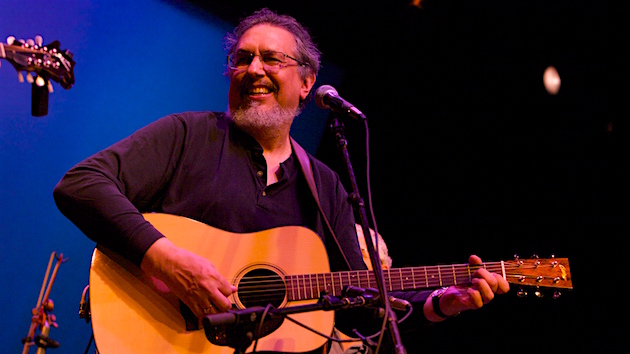
After taking 22 years away, what did you discover in your voice upon your return?
I found I had learned to sing a lot better. Even before I stopped, I had been given advice in improving my singing. I started at odd moments at putting that in practice. I discovered I enjoyed singing, physically. Phoebe Snow told me everyone will tell you to open your throat. She said it feels like a yawn, so do that. Yawn. It worked. And Jane Sharp, a voice teacher in the Bay Area, told me about your voice not coming from your mouth, but from the mask, the area around your eyes and nose.
You said in an interview you can’t play guitar as quickly as in the past, but have found other things at slower speeds. What are those things?
I’ve always been more interested in being soulful in the choice of music and choice of notes than in being quick. I get more time to seek that out because I don’t do the fast thing anymore. A guy in my band does it, Mark Cosgrove. He does it way better than I ever have. But it’s not absent from my shows. It’s not as if I have to crawl. I can get a good medium tempo. I just can’t burn anymore.
Did the work you did as a luthier, violin scholar, and cultural ambassador refine your ear?
I don’t believe so. The things are very separate to me. My study of violins was not concerned in primary focus with the sound. The best way to explain its impact on my performing now is that it’s indirect in the same way the beauty of a painting doesn’t define its financial value. The first thing with fine art is who made it, the second and third things are when and where, the fourth is the condition, the fifth and sixth, the size and the beauty. The violin is the same, but with the ease of playing and the sound also. Beauty is in the eye of the beholder: everyone has their own taste. Nothing appeals to everyone. The same is true with violins. Mechanically speaking, everyone plays it differently and will produce a different sound. It gets to be tremendously complex.
After violin-making school, I focused on the beauty and technique in the making. At my violin shop, the violins I buy are ones I see beauty in. I have to be able to say you can make it sound beautiful, without interfering with the maker’s ideas.
People mention a long list of styles when they write about you, but only occasionally mention gospel. Yet there’s a preacher in you, a rich gospel underbelly, isn’t there?
I definitely have roots in gospel. I was a student of [gospel/blues guitarist] Reverend Gary Davis. I started paying for lessons with him, but after a while, in lieu of paying, I brought him to concerts at churches. I had a great joy in churches. I discovered something about guitar playing by listening to preachers. I attempt to get at the sound that Lonnie Johnson got on acoustic guitar. B. B. King’s tone is his own, but his phrasing is that of a preacher. My favorites all sound like preachers.
You know, the musical note called a “rest,” people think is an absence of a note but it’s not. It’s a very important note. If you play no rests, it gives equal value to each note and it’s very unproductive. What preachers do; they give rests. And gospel music is the most consistently moving stuff that there is. I’ve written some tunes and it does influence my music quite a bit. The film Amazing Grace that came out last year, I found one of the most moving experiences I’ve had in a while. I was simultaneously laughing and crying. You have to see it in a theater though.
Songwriting: What are the different processes or entry points you use for writing original songs?
The first thing is that I don’t write prolifically and never did. When people ask me how to write a song, my answer is “Any damn way you can.” A phrase, a turn, a lick — you try to make it a song.
What approach allows you to cover an existing song and make it your own?
I can’t help it. I can’t help it being uniquely mine. I’m not a mimic and cannot reproduce what it was about the original song that affected me. In my reconstruction, I try to emphasize what I thought was just perfect, but I can’t. It’s always just me, always real.
You never perform with a setlist, but start with something and then feel out the audience as the show goes along. Do you know what you will begin with at the Freight?
The truth is, I have no idea. I perform best when I perform what I want when I want to perform it. What determines that, your guess is as good as mine. I don’t know that it’s productive to figure that out. I could get myself in a lot of trouble by trying to put on the straightjacket and do “what I always do.”
Is the political commentary you are likely to interject also improvised?
Yeah, pretty much. I may say things more than once because I certainly think them more than once. It’s not always important to be political, but today, I think it is. I can’t understand why we’re not all out in the street. We’re in imminent danger of losing our democracy. Did you know the government board that watches our elections and the honesty of our elections can no longer meet? There are no longer enough members and more members won’t be nominated because the powers that would nominate them don’t want our elections to be fair. There are stories in the news where people were voting and they saw that the machine changed it to be a vote for someone else. Our voting process is being taken apart subtly, piece by piece.
There’s a movement towards fascism. It’s my role — not as an artist, but as a human, a citizen, as someone who benefits from being in this country — to say something political. It doesn’t come out in every show. People may think from this that I do a show that’s all protest songs, which is not what I do. The strongest protest song I ever heard is "Strange Fruit" [Abel Meeropol’s 1939 song about lynching made famous by Billie Holiday]. It struck me. It’s pretty dramatic. I would have to think carefully [about singing it]. I doubt I would, because it’s not my background. Fortunately, lynching is not taking place. When Billie Holiday performed that song, it was taking place. Which is not to say we’ve come so far. Today, instead of lynching we have bullets.
Nowadays people can make albums in their cars, living rooms, and garages and “release” them on the internet. What are the realities of financing, engineering, and producing an album in a recording studio if you’re not with a big label?
The music industry has changed hugely. When it comes to making a recording, you can do it on your telephone. Or do it in a studio, hire a lot of musicians, pay fees you may never recoup. Even Beyonce and J.C. [Jay-Z], for their tunes being streamed, receive pennies. I’ve received checks for $9. It’s very difficult to make a living from recordings today. It may sound dramatic or like an exaggeration, but due to the technology used, and the position we’ve been put in, it’s impossible.
Taylor Swift, I have huge respect for. For a while, she kept her music off one service because no one was getting paid spit. We need more people to stand up for their colleagues that way. The streaming services couldn’t make a nickel without us and we don’t make a nickel from them. We need to use our power. For many of us, me included, it wouldn’t have made a dent to pull our music. It requires the most powerful musicians to do it. Instead, some of them have started their own service so they make all the money. The musicians’ union should start a movement. But as long as the streaming services are allowed to stream the music of a handful of top musicians, the union will be fine and won’t act.
What traditions or cultural forces continue to attract young musicians to jazz?
This is an ageist business. I don’t get reviewed any longer. I’m too old. I’m 74. Take a look through any publication that has a lot of reviews. You’ll see reviews of a few people [my age] who’ve hung on since they were young.
About attracting new audiences, when I moved to Wilmington, I was approached by people from the symphony. They asked, “How can we get more young people to come?” I gave it thought and told the conductor my thoughts. I suggested losing the tuxedos, except for special occasions. Young people, it’s not part of what they do. He said, “Oh no, no. We don’t want to change anything.” I said, “Goodbye.” I think the only thing then, if you won’t change but want new audiences, is magic.
The other thing is bringing the music to where the people are. Play where young people are going to be. The live thing is so much better than the recorded thing. Even if you just bring chamber music to a club, do it. It’s the same thing with jazz. The time for swing is gone. Dixieland has ossified. The resurgence of bluegrass music is one of the things that is kind of a miracle. Alison Kraus pretty much singlehandedly caused the rebirth of bluegrass. But you know, classical music like jazz used to have written parts that would specify improvisation. Now, you have to do a famous recorded improvisation in those parts.
Are you hearing new voices, musicians, or bands you want to mention?
Birds of Chicago, California Honeydrops, The Milk Carton Kids, and Larry Campbell.
What can you tell us about your soon to be released album, Big Road?
We’re not jazz musicians, but we’re not un-influenced. “Diamond Lil,” a song I wrote years ago [has] ensemble improvisations that I’m proud of. “Big Road “is the first tune, an old Tommy Johnson blues he recorded [titled “Big Road Blues”] in the 1930s on guitar with a whole band including tuba. We have solos where we give impressions of his solo, but played on electric guitars.

